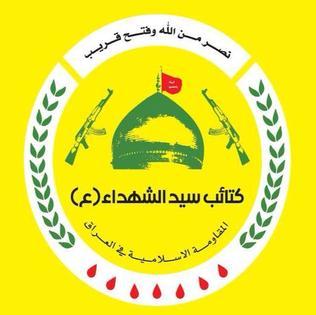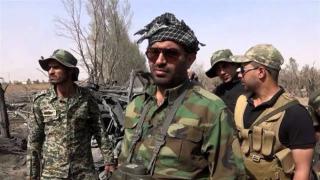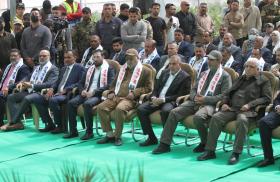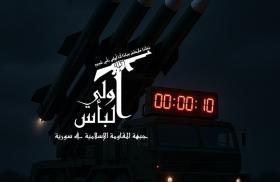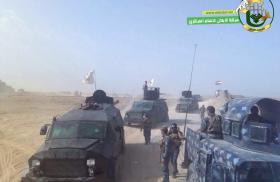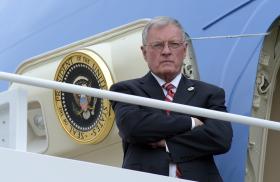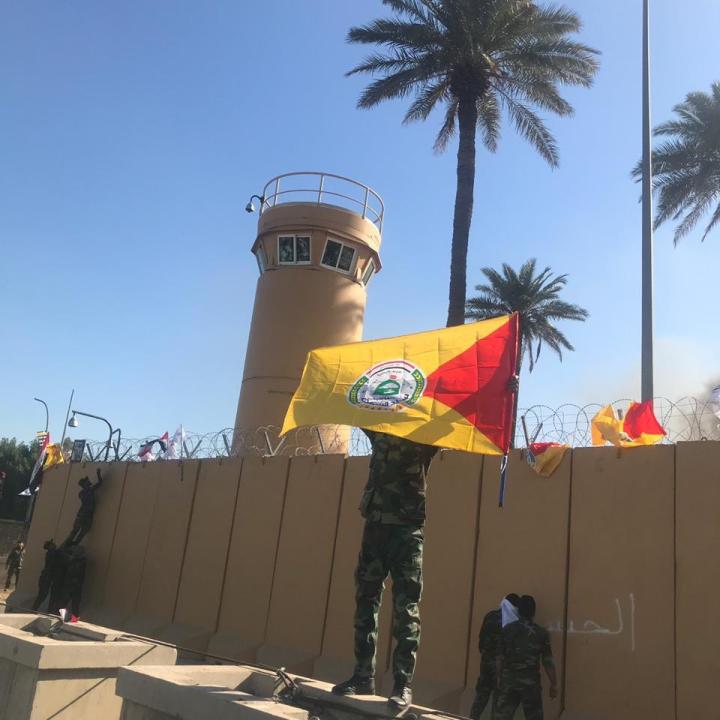
Profile: Kataib Sayyid al-Shuhada
May 3, 2021
Also available in
Updated November 17, 2023

About the Authors
Brief Analysis
Part of a series: Militia Spotlight: Profiles
or see Part 1: How to Use Militia Spotlight: Profiles
A U.S.-designated Foreign Terrorist Organization that emerged from Iraq's Kataib Hezbollah, works directly with Iran's Islamic Revolutionary Guard Corps, and has a transnational focus on the shared regional agenda of Iran's "axis of resistance."
Name: Kataib Sayyid al-Shuhada (KSS) (Masters of the Martyrs Brigade, aka Kataib Abu Fadl al-Abbas, Kataib Karbala).
Type of movement: Tier 2 fasail (armed group). Kinetic military operations, largely transnational in focus.
History and objectives:
- Built around the personality and power base of Mustafa Abdul Hamid Hussein al-Utabi (aka Abu Mustafa al-Sheibani or Hamid Thajil Warij al-Utabi), one of the founding members of Kataib Hezbollah (KH).
- Listed by the United States as a Specially Designated Global Terrorist in July 2008, Sheibani was sidelined within KH in 2010-13 and focused his efforts on operations in the Syrian civil war as part of Iran's Islamic Revolutionary Guard Corps (IRGC) chain of command. KSS members in Syria have been paid by the IRGC, and the group claims to have lost eighty-eight fighters in that conflict.
- In 2014, the leadership of KSS passed to Abu Ala al-Walai.
- KSS became part of the Iraqi security forces when it formed the 14th Brigade of the Population Mobilization Forces (PMF).
- KSS threatened Saudi Arabia in October 2014, stating that "anything of Saudi origin,” whether human or material, was a legitimate future target and warning that the group would “strike and destroy” the kingdom. Abu Ala subsequently stated in July 2018 that he would send KSS militants to fight government forces in Yemen, proclaiming that he was “a soldier standing at the signal of Sayyed Abdul-Malik al-Houthi.”
- KSS claims to have been struck twice in Syria by U.S. aircraft: once in August 2017 at al-Tanf (where it claims thirty-six of its members were killed and seventy-five wounded) and once in March 2021 at Abu Kamal (no claimed casualties). The United States denied the first incident but admitted to the second, characterizing it as retaliation for the group's alleged involvement in the February 16, 2021, rocket attack on Erbil airport.
- Between November 19 and November 25, 2021, KSS claimed to have enrolled 49,000 volunteers in its new recruitment campaign to prepare for a major battle with U.S. forces in Iraq. As Abu Ala stated in a November 19 tweet: “As the hour of determination and the big battle approaches...Kataib Sayyid al-Shuhada announces a recruitment plan for volunteers to join our ranks...The Iraqi people and the muqawama [resistance] factions [should] raise the level of readiness in preparation for the decisive and historic confrontation with the American occupation on 12/31/2021 after [midnight].”
- On November 17, 2023, the U.S. government designated KSS as a Foreign Terrorist Organization.
Chain of command:
- Iran. Clear and convincing evidence indicates that KSS sometimes responds to commands from and is partly financed by the IRGC. The preponderance of evidence shows that the IRGC-Quds Force (IRGC-QF) and Lebanese Hezbollah have provided KSS with financial assistance, military assistance, and intelligence sharing, as well as help in selecting, supporting, and supervising its leadership. Following the January 2020 U.S. targeted killing of IRGC-QF commander Qasem Soleimani, KSS visitors were given high-profile treatment in Tehran, suggesting they had attained a higher status than all other groups except Kataib Hezbollah and Harakat Hezbollah al-Nujaba.
- Abu Ala al-Walai (aka Hashim Bunyyan al-Siraji) is the leader of KSS. On November 17, 2023, he was added to the Specially Designated Nationals and Blocked Persons list by the U.S. government.
- A “vanguard” Iraqi militia network. Chatham House describes “vanguard” networks as having strong central control, a weak connection to society, and primary focus on the transnational axis of resistance and IRGC-QF agenda.
- Partly financed by the Iraqi state. KSS operates the state-funded 14th Brigade of the PMF. Chain of command nominally runs through the Popular Mobilization Commission of the Prime Minister's Office and up to the prime minister. In practice, KSS PMF units frequently disobey the government's chain of command while legally remaining organs of the state.
Affiliate relationships:
- Strong and supportive relations with Lebanese Hezbollah and other transnational "axis of resistance" groups.
- Sibling rivalry with Kataib Hezbollah, from which Abu Mustafa al-Sheibani exited to form KSS.
- Rivalry with the Badr Organization and other Iraqi "resistance" factions (especially concerning profile and recruitment), but giving way to coordination when all such factions are threatened.
- Possible connection to the Saraya Awliya al-Dam brand, relating to the February 2021 rocket strike on Erbil.
- Al-Muntaserun (The Victors), a KSS political arm, was slated to compete in Iraq's December 2023 provincial elections, joining the Asaib Ahl al-Haq (AAH) sub-list Tahalof al-Safwa al-Watani (National Elites Coalition) within the overarching Badr-led Tahalof Nabni list. In doing so, KSS will caucus with AAH and Ahmed al-Asadi, Iraq's minister for labor and social affairs and the leader of Kataib Jund al-Imam (the PMF's 6th Brigade), while competing with Badr and Faleh al-Fayyad's portions of Tahalof Nabni in Diyala.
- KSS held a strengthened editorial role in the major militia outlet Sabereen News from November 2021 until late March 2022, when Abu Ala al-Walai's son Jaafar Hashim Bunyyan Rahim al-Saraji was censured for ordering the burning down of the Kurdistan Democratic Party's offices in Baghdad and removed from editorial control.
- Member of the Islamic Resistance of Iraq umbrella brand.
Subordinate elements:
- The 14th Brigade of the PMF, an Iraqi state organ. This formation is under the administrative and operational control of KSS leaders.
- Multiple covert-action cells responsible for roadside bombings, rocket strikes, and assassinations may have overlapping membership with the KSS PMF brigade.
- KSS runs iNEWS TV, a media network that employs a less religiously conservative style than other muqawama channels. Abu Ala and KSS have their own separate Telegram channels.
- Falih Khazali, a political representative and spokesman for al-Muntaserun/KSS, has been a member of parliament for two terms (2014-18 and 2018-present).

